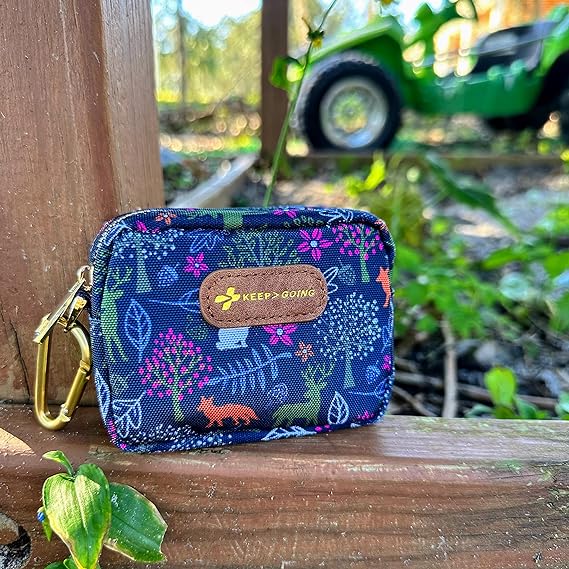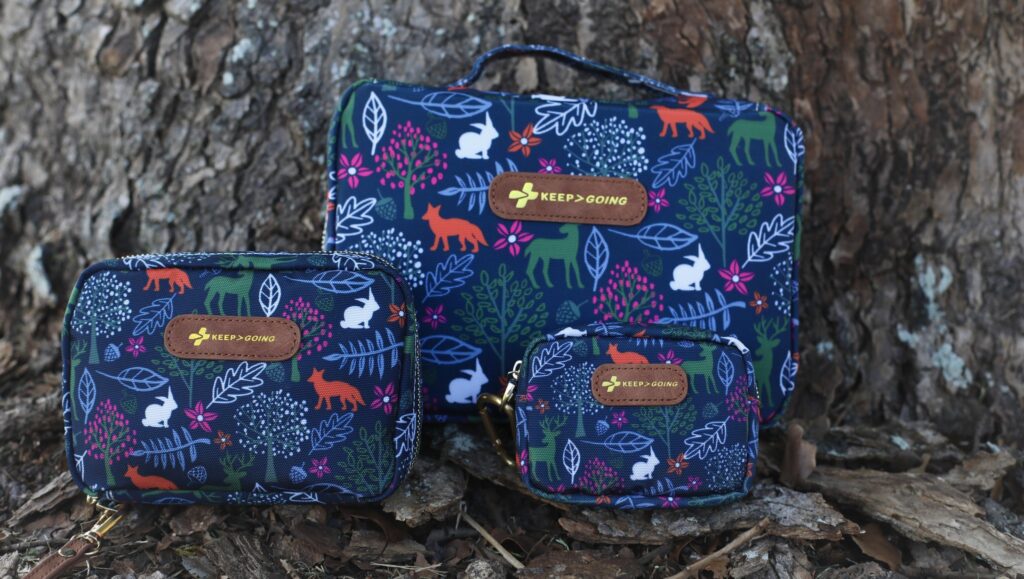
Let’s be honest, family adventures are equal parts magic and mayhem.
One minute, you’re hiking through wildflowers with snacks packed and spirits high. The next, someone’s tripped on a rock, Olive’s (my Frenchie) stepped in a mud puddle, and Mr. Sweet Greens somehow managed to get a splinter through his glove. (True story.)
That’s exactly why I’ve fallen head over hiking boots for the KEEP>GOING First Aid Kit, a total mom-level lifesaver that’s now permanently packed in my bag, car, and RV.
Created by a fellow mom of four (so you know it’s the real deal), this kit is the perfect mix of smart design and stylish practicality. It’s TSA-approved, water- and stain-resistant, and comes with 130+ first aid essentials like burn relief, bandages, antiseptic wipes, tweezers, and even those tiny little scissors you never have when you need them most.
Basically, it’s peace of mind, zipped up in a cute case.

🌿 Why I Love It
💚 Mom-designed + travel-ready: Because no one understands family chaos better than a mom who’s lived it.
💼 Compact, stylish case: Water- and stain-resistant with trendy patterns like Tie-Dye, Woodland (my favorite!), and Tropical Blooms.
🧳 TSA-approved, Fits right into carry-ons, glove compartments, and diaper bags without taking up valuable snack space.
🩹 Loaded with 130+ essentials, From mini bandages to burn cream, it’s like having a nurse in your backpack.
🚗 Four sizes to choose from, Mini (60 pieces) to SuperKit (270 pieces), so there’s one for every adventure.

✨ 7 Everyday Adventures KEEP>GOING Was Made For
Because life doesn’t happen inside the house, it happens on the go, with messy, beautiful, unpredictable moments.
1. Mountain Hikes + Muddy Trails ⛰️
If you’ve ever hiked with kids, you already know, someone will fall. Someone will whine. Someone will ask for snacks (again and again). With the KEEP>GOING kit in your backpack, at least you’re ready for scraped knees, bug bites, and whatever nature throws your way.
2. Farmer’s Market Saturdays 🍓
Between berry sampling, lavender bouquets, and bumping into everyone you know in Banner Elk, it’s easy for small cuts or bee stings to sneak in. I keep the MiniKit in my tote, it’s adorable and functional.
3. Road Trips + Rest Stop Chaos 🚙
We’re a road-trip family. From the mountains to the coast, our glove compartment is basically a survival zone, snacks, sunscreen, hand wipes, and now the KEEP>GOING kit. Because when someone manages to get a paper cut from a map (yes, it happened), you’re prepared.
4. Picnics + Paddleboards 🏖️
Sun, water, sandwiches, and somehow… minor injuries. Between paddleboard dings and stepping on rocks barefoot, this kit saves the day every time. Bonus: it’s water-resistant, so it’s perfect for lake days.
5. Backyard BBQs + Bonfire Nights 🔥
No one plans on blisters from new sandals or mosquito bites that swell like golf balls. I set the kit on the picnic table next to the marshmallows, because s’mores and safety can totally coexist.
6. Kids’ Sports + Weekend Tournaments ⚽
Between turf burns, bee stings, and “mystery splinters,” I’ve learned it’s not if you’ll need a first aid kit, it’s when. KEEP>GOING is the MVP of the sidelines.
7. Glamping, Camping, or Cabin Weekends 🏕️
Our adventures in the Blue Ridge often come with campfires, hikes, and unexpected “ouches.” Even though Eben is grown and doesn’t camp much with us anymore, it never fails that Mr. Sweet Greens or I hurt ourselves in one way or another. OR, there’s Olive, I had to use my kit to get a tick off her on our last trip and then clean her up afterward! I love knowing I can grab my kit, unzip, and instantly find what I need (no rummaging through random Ziploc bags).
💚 A Mom-Approved Must-Have
What I love most about KEEP>GOING is how intentional it feels. Every item is thoughtfully included, the quality is top-notch, and it’s all tucked into a design that makes you want to actually use it.
And as someone who lives in a small mountain town where adventure (and nature’s surprises) are never far away, it’s become one of my favorite travel companions.
If you’ve ever found yourself with a splinter mid-road trip, a scraped knee during a family hike, or a surprise bee sting at a summer picnic, you’ll totally get why I won’t leave home without mine.
🛒 Where to Get Yours
You can find these lifesaving kits directly at keepgoingfirstaid.com or on Amazon.
They come in several sizes and a variety of stylish prints, so you can grab one for your car, your hiking bag, your diaper bag, even one for Grandma’s house.
Because life’s little adventures are a lot more fun when you’re ready for them. 🌿
So go ahead, pack your snacks, fill your water bottles, and don’t forget your KEEP>GOING First Aid Kit, your future self (and your kids’ scraped knees) will thank you.







